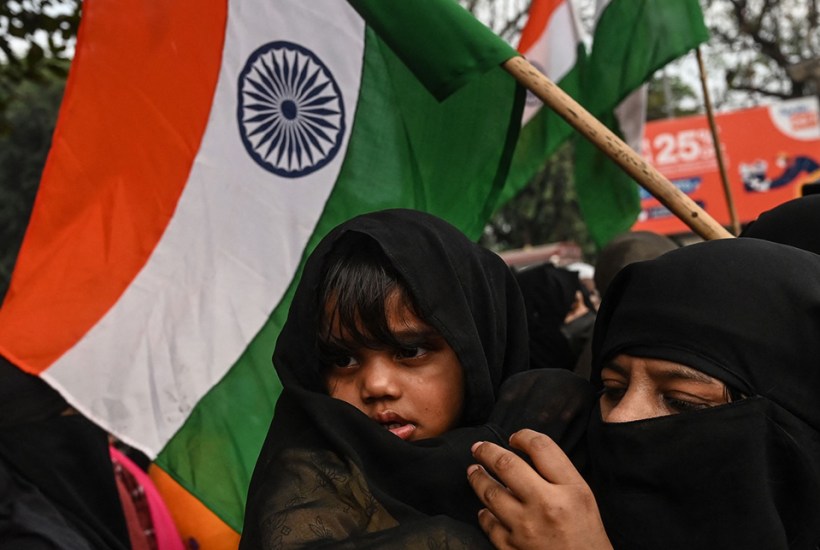Greens leader Adam Bandt disrespects the Australian flag as a hurtful symbol of racism. Black Power-saluting Greens Senator ‘I sovereign’ Lidia Thorpe disrespects the ‘colonising’ Queen as a coloniser. She betrayed the depth of her incoherence and ignorance. Queen Elizabeth II has probably presided over the decolonisation of more countries from her empire than any other monarch in history and then welcomed them all into the Commonwealth as sovereign states. The perpetually outraged Bandt and Thorpe – frequently wrong yet seldom troubled by self-doubt amid adolescent antics – should put plaques on their desks engraved with the homily: Better to remain silent and risk being thought a fool, than talk and remove all doubt.
Flags are the most prominent symbols of nations. Soldiers in particular take special pride in them and are literally prepared to die for everything they symbolise. Just think of Joe Rosenthal’s iconic second world war photo ‘Raising the Flag on Iwo Jima’. In 1982, the French contingent of the UN peacekeeping force in southern Lebanon told the invading Israeli forces it would fight to hold its lines. The Israeli commander refused to believe the French colonel, as the latter had neither the men, arms nor mandate to fight the fully mobilised Israeli force. To prove his intent, the Frenchman ordered his men to lay down the French tricolour across the road. The Israelis paid him the courtesy of driving around the flag rather than over it.
The Bandt-Thorpe theatre of gestures demonstrates contempt for ‘Australia’s foremost national symbol’ that ‘has become an expression of Australian identity and pride’ (PM&C). Channelling Trump’s advice to Congresswoman Ilhan Omar, Westerners forever trashing their country should live for a spell in a desperately poor country where life is Hobbesian – nasty, brutish and short – before returning with a better appreciation of the goodness of their home country.
India is the world’s biggest democracy. Just the number of India’s Muslim voters exceeds the total number of voters in all Western countries bar the US. Since becoming PM in 2014 and especially after re-election with increased majority in 2019, Narendra Modi has overseen the rise of Hindu fundamentalist activism and the accompanying relegation of 200 million Muslims to de facto second-class citizens through legal manoeuvres, administrative actions and street thugs. The response of Muslims to this attempted marginalisation and silencing of their community has been most revelatory. I was last in India in February–March 2020 before world borders closed in the great lockdown. From mid-December 2019 to near the end of March 2020, Delhi was gripped by the Shaheen Bagh protest, named after the suburb that was its site, led mainly but not exclusively by Muslim women.
In common with nationalists everywhere, Modi’s BJP projects itself as the party of muscular nationalism and ostentatiously adopts the outward symbols of national pride. It came as a rude shock therefore when students, women and other protestors across India, particularly Muslims, followed the lead from Shaheen Bagh to appropriate the main nationalist symbols with spontaneity and gaiety to celebrate their core Indianness. The national tricolour was adopted as the symbol of the protest, the national anthem became its song, and the preamble to the constitution the vocabulary. On Republic Day – 26 January, another echo of Australia! – which marks the formal adoption of the constitution in 1950, students from Jamia Millia, a prominent Islamic university in Delhi, read the preamble to the constitution aloud in public spaces before raising the tricolour and singing the national anthem. The preamble proclaims liberty, equality, justice and fraternity for all Indians and respect for all faiths in Hindi, English and Urdu (the language of India’s Muslims).
In the process the women and youth of India articulated a counter-narrative of patriotism and reset the terms of engagement between citizens, the government and the constitution. This is all the more striking for diverging from the trend to identitarian politics in contemporary Western democratic societies. The BJP’s slogan of ‘Akhand Bharat’ (indivisible India) has an external reference point: India’s territorial integrity is sacrosanct and no foreign power will be allowed to break it apart. The protestors ‘domesticated’ the slogan: India’s ruling party will be prevented from threatening national integration by labelling and compartmentalising Indians into identity groups divided by religion and caste.
The country’s unity thus becomes a sacred obligation entrusted by the constitution to every citizen. The hijab-clad and tricolour-draped young Muslim women challenged Modi’s Hindu supremacist narrative directly by instrumentalising the constitution for framing their engagement with democratic politics. Furthermore, and just as important, they articulated their demands and asserted their rights as Indians, without sacrificing their Muslim identity. By directing their demands at the elected government, they expanded the conception of liberal democracy, rescuing it from the majoritarian trap in which the Modi government had imprisoned it.
In other words, democracy, citizenship, constitutional governance and minority rights were forged into one powerful national identity. They emphatically and visually rejected BJP efforts to downsize their destiny as India’s Muslims, instead reimagining the idea of a liberal, pluralistic, tolerant, inclusive India embodied in the constitution.
A less hypocritical Bandt would uproot himself from Australia and return to the country of his ancestors. A less hypocritical Thorpe would not have sought election to parliament and would resign to take up the politics of street protest. I’m not holding my breath. Instead, perhaps Bandt could lead a Greens delegation to India to learn from its Muslims the dangers of identitarian politics and divisive rhetoric and the value of inclusive citizenship. It might also help them to register the reality that a sizable chunk of immigrants are excluded from their imagination and agenda that conceptualises Australia in binary ethnic categories of Europeans and Aborigines. India will also surely help them to appreciate why energy policy requires hard trade-offs, not soft slogans.
Got something to add? Join the discussion and comment below.
Get 10 issues for just $10
Subscribe to The Spectator Australia today for the next 10 magazine issues, plus full online access, for just $10.
You might disagree with half of it, but you’ll enjoy reading all of it. Try your first month for free, then just $2 a week for the remainder of your first year.














Comments
Don't miss out
Join the conversation with other Spectator Australia readers. Subscribe to leave a comment.
SUBSCRIBEAlready a subscriber? Log in